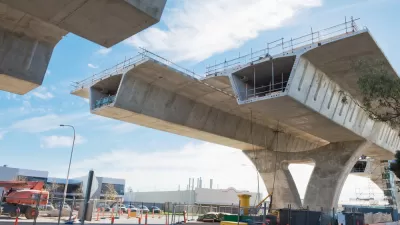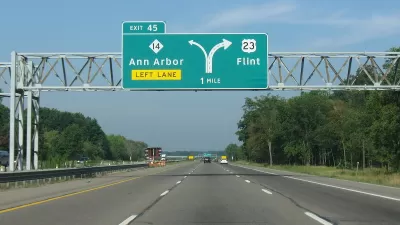The Michigan Department of Transportation will start a $1 billion, 14-year construction project later this year, on I-75, north of Detroit. Some community members are still wondering if the project is necessary.
Eric. D. Lawrence reports on the looming plans to widen the I-75 freeway outside of Detroit. "The project will modernize interchanges, replace all vehicle and pedestrian bridges and add a lane north and south to be used for carpooling during rush hour and regular traffic at other times," according to Lawrence.
Much of the focus of the article is devoted to the lingering questions about the wisdom of the 14-year, $1 billion project:
The initial reaction to the project has been mixed. Some are pleased that a major highway with obvious signs of wear and tear over the past five decades is finally getting rebuilt. Others suggest widening the more than 17-mile route from Auburn Hills to Hazel Park is an outdated approach to regional planning that would divert attention and resources from public transit.
The article includes soundbites from opponents to the project as well as the Michigan Department of Transportation. The latter insists the project is a "fix-it-first" project. Lawrence also devotes attention to the construction schedule, which splits the project into eight separate sections, and the funding allocations. The federal government is funding 80 percent of the final bill for the project. But most of the article's in-depth coverage details the political conversation occurring in response to the project.
FULL STORY: I-75: Mixed feelings on the $1B project

Maui's Vacation Rental Debate Turns Ugly
Verbal attacks, misinformation campaigns and fistfights plague a high-stakes debate to convert thousands of vacation rentals into long-term housing.

Planetizen Federal Action Tracker
A weekly monitor of how Trump’s orders and actions are impacting planners and planning in America.

San Francisco Suspends Traffic Calming Amidst Record Deaths
Citing “a challenging fiscal landscape,” the city will cease the program on the heels of 42 traffic deaths, including 24 pedestrians.

Defunct Pittsburgh Power Plant to Become Residential Tower
A decommissioned steam heat plant will be redeveloped into almost 100 affordable housing units.

Trump Prompts Restructuring of Transportation Research Board in “Unprecedented Overreach”
The TRB has eliminated more than half of its committees including those focused on climate, equity, and cities.

Amtrak Rolls Out New Orleans to Alabama “Mardi Gras” Train
The new service will operate morning and evening departures between Mobile and New Orleans.
Urban Design for Planners 1: Software Tools
This six-course series explores essential urban design concepts using open source software and equips planners with the tools they need to participate fully in the urban design process.
Planning for Universal Design
Learn the tools for implementing Universal Design in planning regulations.
Heyer Gruel & Associates PA
JM Goldson LLC
Custer County Colorado
City of Camden Redevelopment Agency
City of Astoria
Transportation Research & Education Center (TREC) at Portland State University
Jefferson Parish Government
Camden Redevelopment Agency
City of Claremont





























